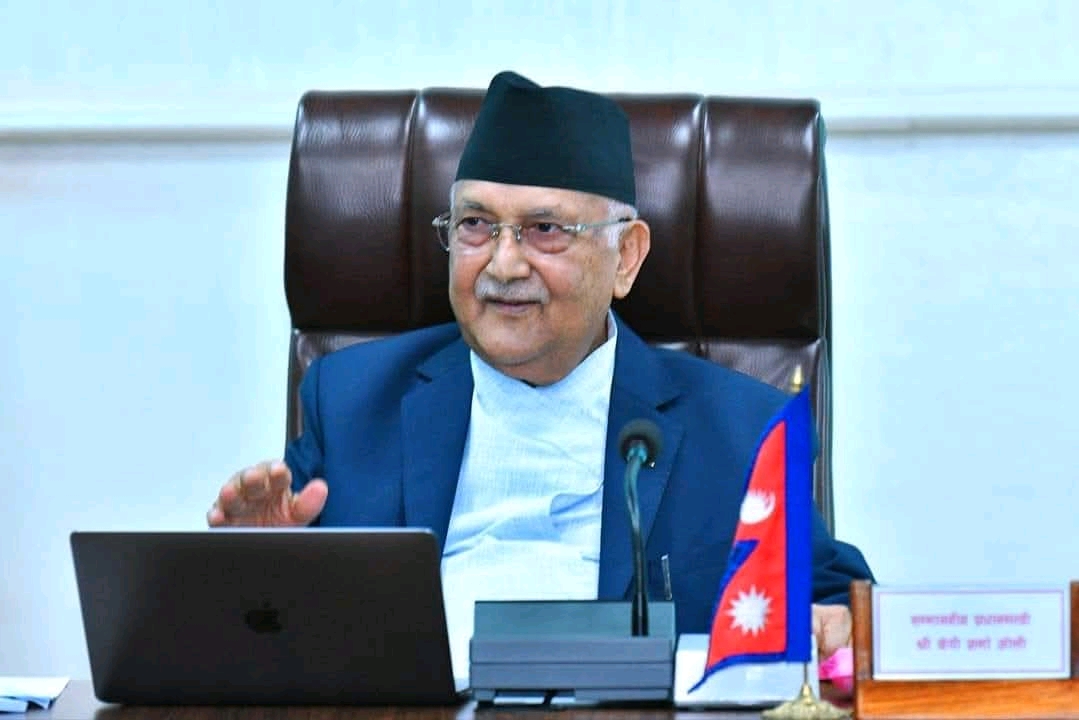

KATHMANDU: Prime Minister and Communist Party of Nepal (Unified Marxist–Leninist) chair KP Sharma Oli has moved to consolidate his hold over the party, declaring that only former president Bidya Devi Bhandari poses a challenge to his authority and accusing rivals of stoking factionalism ahead of a key party convention.
The UML chair, who abruptly postponed the party’s scheduled central committee meeting last week, has turned his official Baluwatar residence into a hub of marathon meetings, training sessions and pep talks for party leaders and cadres. On Wednesday evening, Oli summoned Kathmandu district leaders, central committee members, and Bagmati Province officials for a closed-door lecture that turned into a scathing critique of Bhandari and her allies.
“Except for Bidya, no one else in the party has the courage to challenge me,” Oli told the gathering, according to Kathmandu district chair Dipak Niroula, who later released a detailed summary of the meeting. “If she leaves, everything will be settled. She cannot renew her membership, and the party will decide. A former president should not return to active politics.”
Rift with Bhandari
Bhandari, a two-time UML vice-chair and Nepal’s ceremonial head of state from 2015 to 2023, has sought to reassert herself in party politics after her presidency ended. Her camp has pressed for greater influence in the run-up to the UML’s upcoming statute convention, where internal rules and leadership structures will be debated.
Oli, however, has bristled at her comeback. He accused Bhandari of “inappropriate activities” for mobilizing dissidents and hosting gatherings critical of him. “She has been going around assembling those who do not support the party line. Even defamatory pieces against me have been published,” Oli said.
He also claimed he was the one who had advanced Bhandari’s career when others dismissed her. “People used to call her the queen mother, but I put her forward as president,” he said. “Now, it is impossible for her to return and lead the party.”
Targeting Party Rivals
Oli’s remarks extended to other senior leaders, including Ishwar Pokhrel, UML’s vice-chair and a long-time confidant who has increasingly sided with Bhandari. “Ishwar has lost his way,” Oli said, likening Pokhrel’s dissent to “an unlucky person getting angry at mealtime.”
He warned that factional maneuvering risked weakening the UML just as it prepares for its statute convention. “The statute convention is a unity convention,” Oli said. “Otherwise, the general convention will settle accounts.”
Oli sought to remind cadres of past betrayals, recalling how Bamdev Gautam split the party in 1997 when UML was poised to win a two-thirds majority. “We kept expelling each other, and the current party emerged from that struggle,” he said.
Consolidating Control
The 72-year-old Prime Minister presented himself as the indispensable leader of Nepal’s largest communist party. “I am healthy. The demand of the time and the will of the comrades mean my leadership continues,” he said, dismissing calls for age or term limits.
He argued that Bhandari lacked both experience and credibility to run the party. “She once told me, ‘Please take responsibility, I cannot run it.’ Yet today she says her membership was eaten by Chyasal [a UML faction],” Oli said. “She never even applied for renewal properly.”
The UML chief stressed that politics was not about individuals but about preserving the communist movement. “Bhandari is not property. The movement must be saved. Sentiment alone cannot sustain the party,” he said.
Wider Political Context
Oli’s remarks come as Nepal’s fragmented political landscape prepares for another cycle of realignments. The ruling Nepali Congress leads a shaky coalition, while UML, still the single largest party in parliament, is torn by leadership disputes.
Analysts say Oli’s aggressive push against Bhandari underscores his determination to keep the party firmly under his control, even at the risk of alienating veteran figures.
He reminded cadres that his leadership had produced new political faces, including Rabi Lamichhane, now the head of the Rastriya Swatantra Party, and Rajendra Lingden of the Rastriya Prajatantra Party. “I made them leaders, and we even supported Lingden in Jhapa,” Oli said.
Oli also warned against undermining republicanism and the communist legacy. “The ideals of Madan Bhandari are sacred. They are not a family property, nor can a foundation preserve them,” he said, referring to the late leader and Bhandari’s husband, who was revered within UML.
The Road Ahead
Despite the bitter rhetoric, Oli insisted that unity remained the ultimate goal. “Let us not inflate Bhandari’s stature in the name of respect,” he told cadres. “Individuals are not bigger than the movement.”
Yet his assertion that only Bhandari poses a challenge highlighted the scale of the rift inside Nepal’s oldest communist party. Whether the former president bows out quietly or pushes back could determine the UML’s trajectory ahead of the statute convention.
For now, Oli appears to be betting that his personal dominance, combined with institutional backing, will keep the party firmly in his hands.